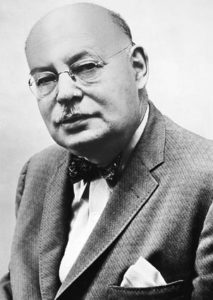Rudolf Dreikurs — A Biographical Summary
Copyright 2008, Eva Dreikurs Ferguson
 Dreikurs was born in Vienna in 1897 into a merchant family that had attained comfort without opulence. A first born with a sister five years younger, he learned music at an early age as well as foreign languages (French and English) when a little older. He retained his love of music throughout his life time. As an adult he composed songs, and he played chamber music in his home, at varying times playing the piano, violin, viola, and cello. He loved playing the piano and often played four-handed pieces or even two-piano music when another musician was available. From the age of 50 onward he had two pianos in his home. In contrast, he was not an avid linguist. In later years, when he had to present lectures in French or English he could do so, but he never prided himself on his linguistic skills.
Dreikurs was born in Vienna in 1897 into a merchant family that had attained comfort without opulence. A first born with a sister five years younger, he learned music at an early age as well as foreign languages (French and English) when a little older. He retained his love of music throughout his life time. As an adult he composed songs, and he played chamber music in his home, at varying times playing the piano, violin, viola, and cello. He loved playing the piano and often played four-handed pieces or even two-piano music when another musician was available. From the age of 50 onward he had two pianos in his home. In contrast, he was not an avid linguist. In later years, when he had to present lectures in French or English he could do so, but he never prided himself on his linguistic skills.
In World War I, Dreikurs became a soldier at the age of 18 and was commissioned as a lieutenant in the Austrian Army. During his adolescent years he had become involved in youth groups focusing on idealistic causes, involving humanism and nature and social ideals, and he was not militaristic in his outlook. His concerns with morality and spirituality were broadly concerned and not limited to a single faith or denomination. He worked strongly for peaceful co-existence between individuals, groups, and nations, and undoubtedly the horrors he experienced in World War I strengthened his resolve to help humanity rely on cooperation rather than destruction in resolving conflicts.
After his military duties, he went to medical school and to specialty training in psychiatry, a newly developed medical specialty. In treating patients in his private practice he sought the advice of elders and leaders in the field. Thus he met Alfred Adler, the founder of Individual Psychology. He joined the discussions and work led by Adler, including work as counselor in the child guidance centers established in the public schools in Vienna. Dreikurs became a leader in the Vienna Adlerian activities, and when Adler died in 1937 it was Dreikurs who went to Brazil to fill in a lecture tour in Adler’s stead.
Following the trip to Brazil, Dreikurs moved to Chicago and developed a psychiatric practice there. His concerns with community psychiatry, well established in his work with Adler in Europe, continued. He led community child guidance centers, and continued his work with schools. His life-long concern with prevention led him to focus on parenting and educational training. He helped establish the North American Society of Adlerian Psychology and established its first national journal. He helped establish the International Association of Individual Psychology after World War II, He founded an international summer school in 1962 (its umbrella organization being later called ICASSI). The international summer school followed a model of an earlier program that had been established by Adler.
Dreikurs expended his energies on helping children and youths. He focused on the democratic processes that were needed in raising and educating children. He continued as well as furthered the educational and counseling methods developed by Adler and colleagues in Vienna. Although a noted psychiatrist and eminently effective in working with seriously disturbed individuals, in his writings Dreikurs was concerned with the norms involved in problems of everyday life and not merely with treatment of psychopathology. Dreikurs recognized that psychological difficulties entailed disturbed social relationships. For him, the values, beliefs, and human relationships of individuals and groups were crucial in psychological well-being. Thus he wrote on group dynamics and group psychotherapy, as well as on music therapy that integrated his appreciation of both music and group processes.
During his lifetime, his teaching of democratic methods for conflict resolution and his emphasis on encouragement and natural consequences was often not well accepted. Due to his efforts, however, thousands of people are now reading his books and raising responsible children with encouragement and mutual respect. Although Dreikurs died in 1972 at the age of 75, his influence continues and grows to the great benefit of communities around the world.

